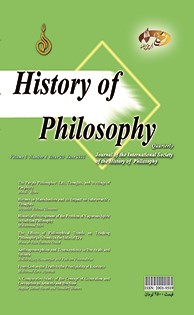A Comparative Study of the Concept of Generation and Corruption in Aristotle and Ibn Sina
Subject Areas : Connection of philosophers’ views and philosophical schools with the social and philosophical conditions of the time
1 - Vali-e-Asr University, Rafsanjan,
Keywords: Generation corruption growth and shrinking four-fold elements Aristotle Ibn Sina transformation,
Abstract :
The treatise On Generation and Corruption is one of the treatises on nature which Aristotle wrote in about 347-335 BC. This treatise consists of two books: in the first one, Aristotle introduces generation and corruption as two basic properties of sublunary bodies. The other properties of sublunary bodies include transformation, growth and shrinking, contact, action and interaction, and mixing, which are completely distinct from each other in Aristotle’s view. He rejects absolute generation and corruption and criticizes Empedocles’ theory of equating them with transformation. The second book is mainly devoted to a profound investigation of the four primary elements (water, earth, air, and fire), their nature, and the quality of their changing into each other. Aristotle believes that these elements come into being in a cyclical fashion and none is prior to the other. Ibn Sina divided the existents of the world into four groups of intellects or angels, angelic souls, spherical bodies, and the bodies of the world of generation and corruption. He matched the ontological distinction between immaterial beings and those beings which are coupled with matter and are subject to generation and corruption with the astronomical distinction between the spheres and the sublunary world. Ibn Sina followed Aristotle in this regard. In this paper, the authors analyze the concept of generation and corruption in bodies from the viewpoints of Aristotle and Ibn Sina. They also examine the extent of Aristotle’s influence over Ibn Sina concerning generation and corruption, as well as the latter’s innovations in this regard.
ابنسينا، الاشارات و التنبيهات، ترجمه حسن ملکشاهي، مرکز نشر دانشگاهي، تهران، 1377. #
ابنسينا، دانشنامه علائي (بخش الهيات) همدان، انجمن آثار و مفاخر فرهنگي و دانشگاه بوعلي سينا، چ2، 1383. #
ابنسينا، طبيعيات شفا، ترجمه ابراهيم دادجو، تهران، انتشارات اميرکبير، 1376. #
ابنسينا، القانون في الطب، ترجمه عبدالرحمن شرف کندي، تهران، انتشارات سروش، 1376. #
ارسطو، فن سماء طبيعي، ترجمه محمد علي فروغي، تهران، چاپخانه مجلس، 1316. #
ارسطو، در کون و فساد، ترجمه اسماعيل سعادت، تهران، مرکز نشر دانشگاهي، 1377. #
نصر سيد حسين، نظر متفکران اسلامي درباره طبيعت، تهران، انتشارات خوارزمي، 1359. #
مسگري، احمد؛ عسکري، علياکبر، ماده اولي و تبيين کون و فساد در فلسفه ارسطو»، دوره 40، ش1، تابستان و پاييز 1391. #
The Works of Aristotle, translated in to English, vol. II, de Generatione et Corroptione, by Harold H. Joachim, Oxford. #


